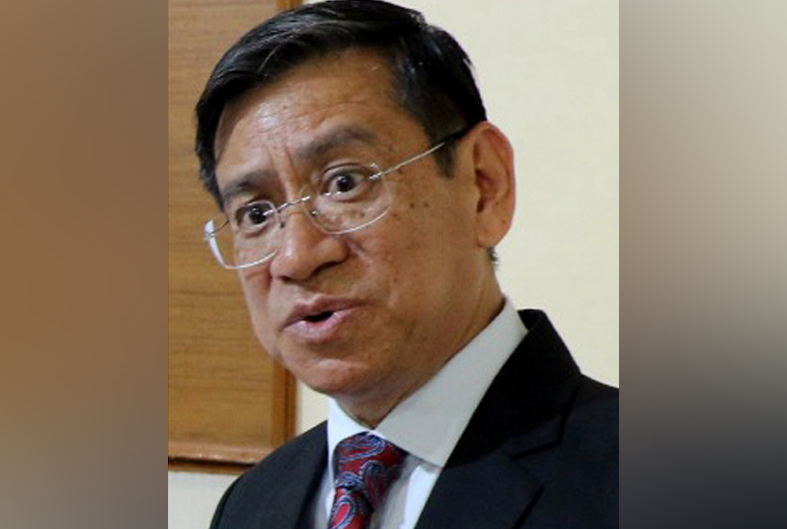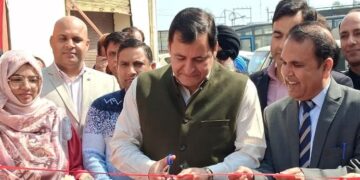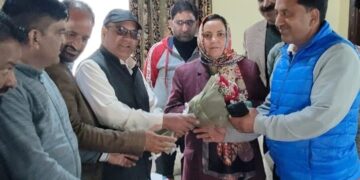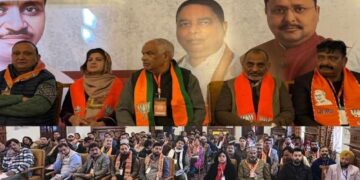SRINAGAR: Chief Justice, High Court of Jammu & Kashmir and Ladakh, Justice N. Kotiswar Singh today inaugurated one-day Annual Stakeholders Consultation on Children in Conflict with Law at Tagore Hall here.
Justice Tashi Rabstan; Justice Sindhu Sharma; Justice Puneet Gupta; Justice Javed Iqbal Wani; Justice Mohammad Akram Chowdhary and Justice Rajesh Sekhri graced the occasion.
The inaugural session was physically attended by Advocate General, D.C Raina; Registrar General, Shahzad Azeem; Principal Secretary to Chief Justice, MK Sharma; Mission Director, Mission Vatsalya, Harvinder Kour; Registry officers, officers from Civil and Police Administration, J&K.
Commissioner Secretary, Social Welfare Department, UT of J&K, Sheetal Nanda; Commissioner Secretary, Social, and Tribal Welfare Department, UT of Ladakh, Padma Angmo; Member Secretary, Ladakh Legal Services Authority, Spalzes Angmo, joined the consultation virtually.
The consultation meet was organized by the Juvenile Justice Committee, High Court of Jammu & Kashmir and Ladakh under the aegis of Child Welfare Committee, Supreme Court of India in association with the Social Welfare Department, UT of Jammu and Kashmir, and Social and Tribal Welfare Department, UT of Ladakh.
In his inaugural address, the Chief Justice while stressing upon the theme of this year’s meet tracing the history of law relating to Child Rights, said that earlier the focus was on victims of offence and now there is a paradigm shift towards the welfare of a child in conflict with law. The Chief Justice underlined that collaboration of stakeholders is necessary to restore such children back into the system.
Recalling the recent visits to Child Care Institutions at Nishat, Srinagar, and Khansahib, Budgam, the Chief Justice appreciated the efforts of the Social Welfare Department in creating and maintaining suitable infrastructure at both places.
Highlighting the circumstances leading the child onto the wrong side of the law, Justice Tashi in his special address appealed to one and all to prioritize prevention over punishment. He called upon the stakeholders to extend empathy and unwavering commitment toward the well-being of children in conflict with the law.
In his welcome address, Member Secretary of Juvenile Justice (JJ) Committee Amit Kumar Gupta gave an overview of the programme and said that this UT-level consultation is being organized by the JJ Committee in order to have deliberations by engaging experts, representatives of different organizations and frontline workers working with the children in conflict with the law to take stock of the work done so far and for the identification of measurable concrete priority actions.
The consultation unfolded across a series of meticulously curated technical sessions that illuminated the multifaceted aspects of child protection.
In the first technical session Assistant Director, NIPCCD, Regional Centre, Mohali, Sonali Kumari, was the resource person, who deliberated upon the topic ‘Prevention and Early Intervention’. In her Powerpoint presentation, she delved into detailed strategies that could pre-empt adversities, emphasizing the pivotal role of proactive measures. She was also the resource person for the fourth technical session in which she explained in detail the rehabilitation mechanisms and the potential of restorative practices in rebuilding young lives.
The second and third technical Sessions were on the topics ‘Diversion, Alternatives to Detention, and Non-custodial Alternatives’ and ‘Right to Fair Trial and Child-Friendly Procedures’ in which resource persons were Justice (Rtd.) B.A. Kirmani and Justice (Retd.) M.H. Attar.
In his discourse, Justice B.A. Kirmani while referring to the report of the Crime Record Bureau published for the year 2020-2021 highlighted that the popular notion about the Child in Conflict with the law belonging to the poor and marginalized section of society is misconceived as the figures for states of MP and Maharashtra reveal otherwise.
Justice M.H. Attar underscored the significance of child-friendly legal processes and a just trial system in nurturing a sense of justice in young minds.
In the last Technical session, the resource person, Owais Wani, DySP (HQ), Srinagar deliberated upon the topic ‘Minimum Age of Criminal Responsibility and Age of Criminal Majority (Preliminary Assessment)’.
He gave a historical perspective regarding the fixing of the age of criminality in various jurisdictions and referred to various constitutional provisions as well as reasons for fixing the age of criminality at 18 years. He also presented a critical analysis of various provisions of the Juvenile Justice (Care and Protection) Act 2015.
The participants in the consultation were Secretaries of DLSA, Principal Magistrates JJBs, Officers from Health, Education, and Police Departments, Members of JJBs, Chairperson and Members of CWCs, Superintendent Observation Homes, District Social Welfare Officers, Counsellors, Representatives of UNICEF, Heads of Law department of various Universities and PLVs.




